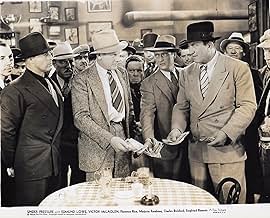Following their success as Flagg and Quirt in "What Price Glory?" (directed by Raoul Walsh), Victor McLaglen and Edmund Lowe starred in a long unofficial series of films playing similar characters. Typically, they played brawny rivals who were quick to sling their fists at each other (usually fighting over a woman), but who never hesitated to team up against a mutual threat. Usually, McLaglen's roughneck character outranked Lowe's (or had some form of authority over him), but the younger and handsomer smoothie played by Lowe would get the last word.
"Under Pressure" is nimbly directed by Raoul Walsh, the best director this team ever had. McLaglen is the foreman of a team of sandhogs who are digging an underwater tunnel from Brooklyn to Manhattan, although McLaglen's leadership seems to consist mostly of snarling things like "Get yer backs into it, you mugs!" while his men are already at the brink of exhaustion. Meanwhile, another team of sandhogs (led by Charles Bickford, very hissable), are digging the other end of the tunnel from Manhattan to Brooklyn. We might expect the teams to meet amicably in the middle, but this is an action movie full of macho he-men ... so the two teams are rivals. Whichever set of sandhogs covers a greater share of the distance underwater will get more money and more work assignments in future. Basically, McLaglen and Bickford are having a contest to see which man has the bigger, erm, shaft.
Lowe is caught in the middle, with less to do than usual in his team-ups with McLaglen. Lowe's character is attracted to a girl, so McLaglen has to be attracted to her too. The love interest is played by Florence Rice, a very beautiful but bland actress who was the daughter of sports columnist Grantland Rice.
Bickford's chief goon, a thug named Tug with an ugly mug, is well-played by George Walsh, the director's burly brother. George Walsh had a promising career in silent films until he landed the title role in "Ben Hur", which proved to be his downfall. The chariot epic was filmed on location in Italy, where it encountered all sorts of production problems until the studio decided to scrap all the footage and start all over on the Hollywood backlot with an entirely new cast. George Walsh's career had lost its momentum in the meantime, and never recovered. Walsh gives a good performance here as Tug, but there's a ludicrous scene in which he, McLaglen, Bickford and Lowe all take turns snarling "I'll see you later" at each other, with no discernible purpose and no real punchline.
Marjorie Rambeau, a character actress who was always under-rated (until her brilliant final performance in "Man of a Thousand Faces") is very good in a small role here. I recommend "Under Pressure" as a good B-level Raoul Walsh film. Second-level Raoul Walsh is better than first-level work by almost any other director.
































